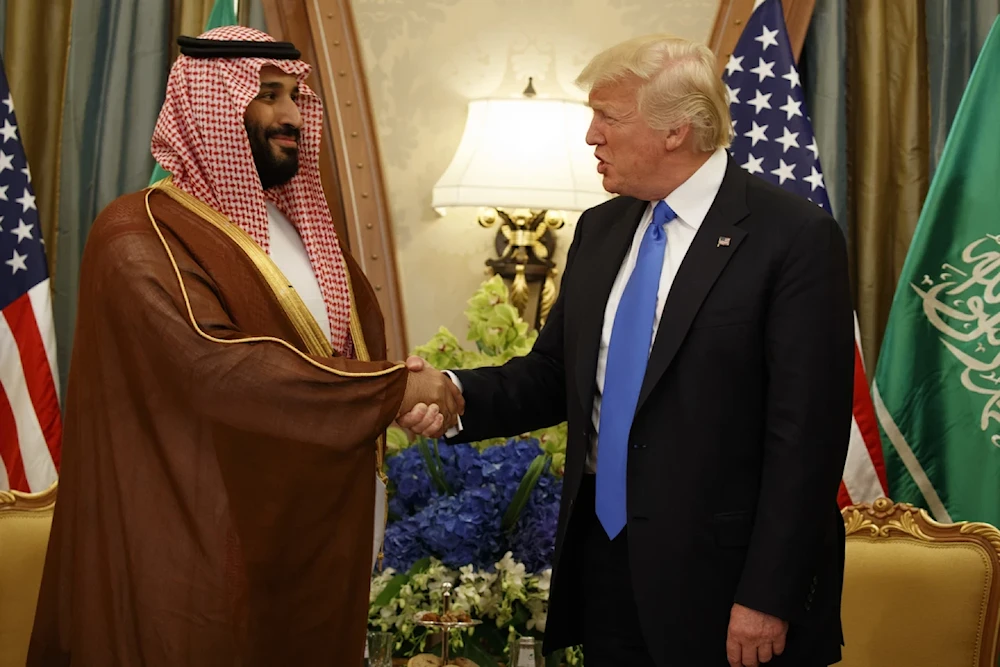US must not offshore its AI to Gulf states: FP
As Saudi Arabia and the UAE push for AI dominance, experts warn the US risks repeating its oil dependence by exporting AI chips and infrastructure to the Gulf.
-

US President Donald Trump, right, shakes hands with Saudi Arabian Crown Prince Mohammed bin Salman during a bilateral meeting in Riyadh, on May 20, 2017 (AP/Evan Vucci)
In an opinion piece for Foreign Policy (FP), Alasdair Phillips-Robins and Sam Winter-Levy warn on Wednesday that the United States is on the verge of repeating a historic strategic mistake, this time not with oil, but with artificial intelligence.
The authors argue that after spending decades reducing its reliance on Middle Eastern oil, Washington is now at risk of becoming dependent once again, this time on AI infrastructure.
Drawing a parallel to the 1867 purchase of Alaska from Russia, the authors note that what was once mocked as "Seward’s Folly" eventually paid off when oil was discovered. In the same way, offshoring AI computing power to the Gulf could look cheap now but prove strategically disastrous in the long run.
Phillips-Robins and Winter-Levy point to the Trump administration’s consideration of approving the mass export of advanced AI chips to Saudi Arabia and the United Arab Emirates. These chips, produced primarily by US companies like Nvidia, are essential for training frontier AI models.
The FP opinion piece highlights that while limited exports to Gulf-based data centers owned by US firms might be manageable, broad approval would risk placing critical US technology under the influence of autocratic regimes whose long-term interests diverge from Washington’s.
Saudi and Emirati ambitions in AI
The authors emphasize that Saudi Arabia and the UAE are aggressively pursuing AI supremacy. According to the FP analysis, Saudi Arabia sees AI as a replacement for oil wealth, while the UAE has empowered figures like Sheikh Tahnoon bin Zayed Al Nahyan, who controls both G42 and $1.5 trillion in sovereign wealth, to lead its AI ambitions.
In a March post on X, Al Nahyan shared details about a meeting that was held with Trump, stating, "the UAE remains committed to strengthening its economic ties with the US by accelerating investments in artificial intelligence, advanced technology, infrastructure, energy, and healthcare, key pillars for sustainable growth and development."
I conveyed the greetings of President His Highness Sheikh Mohamed bin Zayed Al Nahyan to U.S. President Donald Trump during the dinner at the White House, which was attended by senior U.S. and UAE officials, thanking him for the warm welcome and hospitality.
— Tahnoon Bin Zayed Al Nahyan (@hhtbzayed) March 19, 2025
Our discussions… pic.twitter.com/6QxGrlxF3k
G42, as detailed in the piece, has inked deals with Microsoft, backed OpenAI’s Stargate project, and attempted to bring major chip fabrication to the region. These moves are not merely economic; Phillips-Robins and Winter-Levy caution that such AI capabilities would enhance surveillance, cyber capabilities, and military power in the region.
Security risks and China's growing influence
The opinion piece in FP strongly questions the reliability of both Saudi Arabia and the UAE as secure AI partners, citing their deepening ties with China.
The UAE’s G42 has distanced itself from Huawei, yet China remains the UAE’s leading non-oil trade partner. Notably, Beijing and Abu Dhabi have conducted joint military exercises, and their silence on G42’s shift away from Huawei speaks volumes, according to the authors.
Meanwhile, Saudi Arabia’s growing ties with both China and Russia raise additional concerns. As Phillips-Robins and Winter-Levy argue, these countries cannot be fully relied upon to protect US intellectual property or prevent its exploitation.
The authors assert that permitting AI chip exports to the Gulf could deplete the domestic supply and set a dangerous precedent, stressing that “Selling more to Gulf companies will only take them out of the hands of US businesses.” Even if US firms run the Gulf data centers, the authors argue this could trigger a race to exploit cheap energy and capital abroad, weakening US leadership in the AI arms race.
Moreover, the FP article stresses that fears about energy constraints for AI growth in the US are overblown. With permitting reform, the US can expand data center capacity at home or partner with trusted allies like Canada, Norway, or Australia.
Rather than a total rejection of cooperation, Phillips-Robins and Winter-Levy outline a more cautious framework in their FP piece. They propose a deal where Gulf nations gain access to older-generation chips for modest AI projects, while US tech firms retain their most advanced infrastructure at home.
In return, the US should require the Gulf states to cease AI investments in China, adopt export controls, and ensure transparency in how US technology is used. Without these safeguards, the authors argue, the United States would be repeating the same strategic error it spent half a century trying to escape.
As the Foreign Policy article underscores, the stakes extend beyond economics; they are deeply geopolitical. Entrusting Gulf governments with American AI technology risks compromising national security, technological dominance, and long-term strategic autonomy.
Alasdair Phillips-Robins and Sam Winter-Levy call on Washington to act prudently, using its current leverage to craft a strategic, narrowly tailored agreement that safeguards US interests rather than sacrificing them for short-term advantages.

 5 Min Read
5 Min Read








